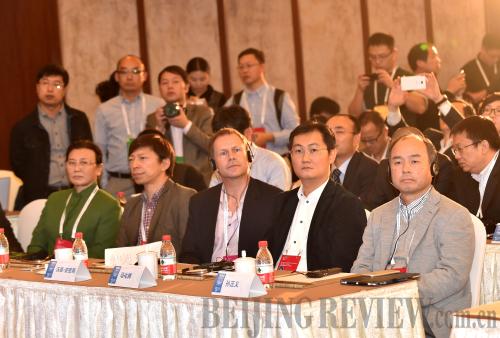 |
|
TYCOON TABLE: Charles Zhang, Chairman of Sohu.com (second left), Pony Ma, CEO of Tencent (second right), and Masayoshi Son, CEO of Softbank Corp. (right), are among the high-profile guests at the World Internet Conference on November 19 (CFP) |
He said that network security is the common challenge facing human society, and effectively addressing these challenges is a common responsibility of governments. He called on countries to strengthen cooperation in cracking down on Internet crimes such as terrorist activities through the Internet, Internet attacks and intrusion of privacy to make the Internet safe.
Lu said that cyberspace in China is governed by Chinese laws. "What we do is in accordance with our laws, and all the moves we take are aimed at protecting our cybersecurity and users' interests.
China is one of the countries worst hit by online threats, with more than 10,000 Chinese websites attacked every month, 80 percent of which are government sites, said Lu.
In the past, China and the United States have accused each other of launching Internet attacks. However, talks and communication relating to the Internet between the United States and China have gone smoothly recently, said Lu
He said that China would like to seek consensus with the United States on how the Internet should be governed.
At a WIC sub-forum held on November 20, participants discussed internet security and international cooperation.
Bing Xiaowu, Chairman of the Board of China Electronics Corp., said that Internet security breaches occur frequently—in 2013 alone, more than 500 million pieces of identification information were leaked worldwide.
He said that threats to Internet security come from five sources: extremists, hackers, terrorists, economic criminals and national governments. These threats not only damage our properties but also hamper national development.
Bing said that, currently, not any single organization or company can cope with these challenges with traditional methods; we must transform our prevention and protection model, open resources and engage in cooperative innovation.
Huang Chengqing, Director of the National Computer Network Emergency Response Technical Team/Coordination Center of China, said that the domain names of more than half of the websites spreading malicious programs in China are registered overseas. Huang said that his organization has established partnership with 127 organizations in 59 countries to tackle Internet security threats.
Countering cyberterrorism
At a sub-forum on countering cyberterrorism with enhanced international cooperation held on November 20, Cheng Lin, President of the Chinese People's Public Security University, said that the Internet has become a new tool for terrorists.
He said that currently, terrorists not only can launch direct attacks on computers, networks and stored information but also can use the Internet to plot terrorist activities, transmit information, transfer funds, recruit followers and abet people to engage in terrorist activities by posting text, audio and video materials.
International cooperation in combating cyberterrorism is a pressing and arduous task, Cheng said. He said that currently, the fight against cyberterrorism is confronted with several difficulties such as the lack of a specified legal framework, effective technology and an international cooperation mechanism.
He suggested that measures should be taken to overcome these difficulties and strengthen international cooperation.
The fact that terrorists are using the Internet also helps law enforcers better learn about what they are up to, said Bruce McConnell, Senior Vice President of EastWest Institute and former deputy head of the Cybersecurity Department of the U.S. Department of Homeland Security. Their digital traces online offer clues to law enforcers to track them down, he said.
Terrorists can recruit new members online and teach people how to make bombs, and we can also teach people how to guard against terrorism through the Internet, McConnell said.
He said that some criminals recently have been found to interact with terrorists, which complicates matters, so there is a lot of room for international cooperation in this area. He said that both the public and private sectors in different countries should work together to combat terrorism.
Email us at: wanghairong@bjreview.com
